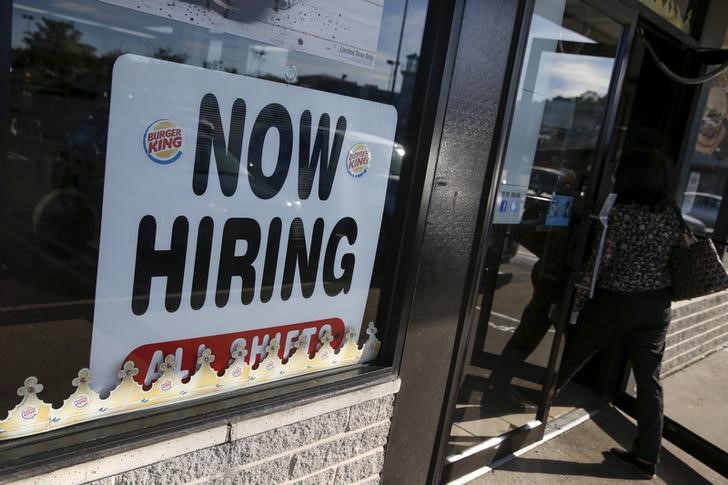Intel stock spikes after report of possible US government stake
Investing.com -- It's payrolls day! The October labor market report for the U.S. will be published at 8:30 AM ET, but is expected to be heavily skewed by the General Motors' strike. Elsewhere, China's factories send out some good news for once, while Brexit stockpiling kept the U.K.'s afloat for another month. Here's what you need to know in financial markets on Friday, 1st November.
1. Payrolls Day, with a strong GM flavor
Two days after the Federal Reserve said it would take a fresh deterioration in the economic picture to justify any further interest rate cuts, the Bureau of Labor Statistics will tell the world how the U.S. jobs market performed in October.
The strike at General Motors (NYSE:GM) will undoubtedly have skewed the headline number for nonfarm payrolls growth, and the forecast of 89,000, compared to 136,000 in September, is something of a crapshoot. In any case, the idea that job creation is slowing against a backdrop of multi-decade lows in the jobless rate is hardly new.
The more reliable indicators will be average weekly hours and average hourly earnings, which will shed light on whether workers are gaining more pricing power as the pool of available labor dries up.
2. China’s manufacturing sector picks up
China’s private-sector factories picked up the pace in October, with both domestic and foreign demand rising significantly, according to a survey by research firm IHS Markit and Caixin. Their manufacturing purchasing managers’ index rose to 51.7 from 51.4 in September. That indicates the fastest rate of expansion since October 2017 and defied expectations for another trade-war-related drop.
The improvement was due in part to the U.S. decision to exempt, temporarily, over 400 types of Chinese products from the latest round of import tariffs. Recent press reports playing up the reluctance of both sides to give much away on trade naturally cast doubt over whether that exemption will stick, notwithstanding the pressure on both countries’ leaderships to relieve the pressure on their economies by declaring some kind of truce.
3. Stocks set to open higher
U.S. stock markets are set to open with a rebound on the back of the Chinese PMI news, albeit there’s little chance of any fresh attempts at new highs in advance of the payrolls report.
By 6:30 AM ET (1030 GMT), Dow futures were up 53 points, or 0.2%, while S&P 500 Futures were also up 0.2% and Nasdaq 100 futures were up 0.3%.
Overnight, European stocks had also been supported by the Chinese news, although Asian markets were a more mixed bunch as most PMIs in the region came out nowhere near as strongly as the Caixin.
4. Brexit stockpiling props up U.K. economy
It’s November and the U.K. is still in the European Union, despite Prime Minister Boris Johnson’s ‘Do or Die’ gambit to meet the already-twice-postponed deadline of Oct. 31.
The pound tested its highest in over a week against the dollar earlier, but analysts see the upside from here as limited, given the prospect of at least two more months of uncertainty.
Stockpiling ahead of the supposed Brexit day propped up the world’s seventh-largest economy in October, the Markit manufacturing PMI rising to 49.6 from 48.3 in September. Within that, the sub-index for inventories rose to 55.6 from 53.6, offsetting ongoing weakness in new orders, output and hiring.
Elsewhere, President Donald Trump told an LBC radio hosted by arch-Brexiteer Nigel Farage that Johnson’s proposed deal with the EU would make it harder for the U.K. to strike a trade deal with the U.S.. Trump also urged Farage to strike an electoral pact with Johnson’s Conservatives to secure a clear pro-Brexit majority at the General Election scheduled for Dec. 12.
5. South African trouble for EMs?
Ratings company Moody's will decide later Friday whether or not to downgrade South Africa's sovereign bonds to 'junk' status, in the face of a spiraling budget problem caused by years of sub-par growth, governance scandals and - most recently - an expensive bailout for the national electricity monopoly Eskom.
Moody's - the last of the major ratings companies to have an investment-grade rating for South Africa - will either keep its rating at the lowest investment-grade notch of Baa3 (perhaps changing the outlook to 'negative' from 'stable', or downgrade it.
A downgrade would mean the country's debt is no longer eligible for all of the funds that are restricted to investing in investment-grade paper. The dollar has risen over 3% against the rand this week in anticipation of a downgrade, taking its year-to-date gains over 5%.
A downgrade would bookend a week of volatility for emerging markets, after the victory of leftwing Peronists in Argentina's elections last weekend.
